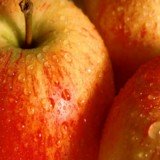Banana Nutrition Facts
Banana Nutrition Facts and Potassium
 Bananas are one of the most popular fruits around, with an average American said to be consuming more than 28 pounds (12.7kg)of bananas every year! They are said to have been first found in the Malaysia region. This is one fruit that you will definitely want to include in your diet, especially after reading this article and you discover the nutrition and health benefits that bananas have.
Bananas are one of the most popular fruits around, with an average American said to be consuming more than 28 pounds (12.7kg)of bananas every year! They are said to have been first found in the Malaysia region. This is one fruit that you will definitely want to include in your diet, especially after reading this article and you discover the nutrition and health benefits that bananas have.
If you want help in weight loss the banana is your man, well fruit, to help you out. It's a fruit that is loaded with many vitamins and nutrients which do a lot for our bodies. In fact, it has been proven that the nutrients and vitamins in bananas have targeted health benefits for our hearts. So there's absolutely no reason why you wouldn't add this fruit in your healthy eating plan.
 Although bananas are yellow on the outside when ripe, the fleshy part which we eat is white-ish. For this reason bananas are put in the white fruits and vegetables group. They are colored by the pigment known as anthoxanthins. A banana together with all the other white fruits and vegetables may contain health-promoting chemicals such as allicin. This may help lower cholesterol and blood pressure. It may also reduce the risk of stomach cancer and heart disease.
Although bananas are yellow on the outside when ripe, the fleshy part which we eat is white-ish. For this reason bananas are put in the white fruits and vegetables group. They are colored by the pigment known as anthoxanthins. A banana together with all the other white fruits and vegetables may contain health-promoting chemicals such as allicin. This may help lower cholesterol and blood pressure. It may also reduce the risk of stomach cancer and heart disease.
Banana nutrition facts show us that bananas are a great source of the mineral potassium. An average banana contains a whooping 467mg of potassium. A few things that potassium does for and within our bodies include:
- Promoting bone health
- Stimulating the nerve impulses for muscle contraction. This in turn then helps in the building of muscles and production of protein.
- Playing an important role in the regulation of blood pressure. It has been proven that a diet that is rich in potassium reduces the risk of hypertension and stroke. So if you are having problems with your blood pressure constantly shooting up, you may include bananas in your diet.
Apart from potassium, bananas also contain Vitamins A, C and B6, Zinc, Riboflavin, Iron, Phosphorus, Magnesium, Pantothenic Acid, Niacin, Copper, Calcium and Thiamin. Just one banana provides about 25% of the Recommended Daily Allowance of Vitamin B6, 11% of potassium, 20% of Vitamin C and 16% of dietary fiber. The great thing about bananas is that they don't contain any sodium, fat or cholesterol. So you can eat all the bananas you want without feeling guilty about it.
 We will now briefly explain some of the benefits of the many minerals and vitamins we find in bananas.Vitamin B6 helps in the production of antibodies in the immune system, the functioning of the central nervous system and in protein metabolism.
We will now briefly explain some of the benefits of the many minerals and vitamins we find in bananas.Vitamin B6 helps in the production of antibodies in the immune system, the functioning of the central nervous system and in protein metabolism.
At high levels, an amino acid known as homocysteine can lead to artery blockage. Vitamin B6 helps to reduce the levels of this amino acid thereby preventing artery blockage, also known as atherosclerosis.
Vitamin C is useful in the formation of blood, absorption of iron and the production of connective tissue. Vitamin C also prevents oxidation of LDL "bad" cholesterol which is not good for you. It also boosts your immune system, helping your body to defend and heal against infections.
Bananas also contain 3g of dietary fiber. Fiber has been shown, through studies, to reduce the risk of coronary heart disease. Banana nutrition facts show that the dietary fiber content in them can help ease constipation. Pectin and the soluble fiber called hydrocolloid found in bananas help to normalize movement through our digestive tract thereby easing constipation.
Bananas have been recognized, through research, for their antacid effects that protect against stomach ulcers and ulcer damage. Banana nutrition facts have shown that substances in them help to activate the cells that compose the stomach lining. When these cells are activated they produce a thicker protective mucus barrier against acids. There are also certain compounds in bananas called protease inhibitors.
These help to eliminate the bacteria in the stomach that have been pinpointed as a primary cause of stomach ulcers. Did you know that our bodies burn off calories from carbohydrates more quickly and easily than calories from protein or fat. Bananas are second to none when it comes to their carbohydrate content. This is why they are great to include in your diet when you want to lose weight or even add them to your bodybuilding recipes.
 Bananas can give an instant and substantial boost of energy because they contain natural sugars and fiber. These natural sugars include fructose, sucrose and glucose. This is why they are great for a snack, a healthy one too. In fact, bananas have also been said to be a great first food for a baby.
Bananas can give an instant and substantial boost of energy because they contain natural sugars and fiber. These natural sugars include fructose, sucrose and glucose. This is why they are great for a snack, a healthy one too. In fact, bananas have also been said to be a great first food for a baby.
So there you go new mommies if you had been wondering what solids you can give your baby. Unlike some other fruits, bananas keep ripening even after they have been picked. This is why they can picked when they are still green.
Banana nutrition facts research discovered that regular consumption of fruits and vegetables, especially bananas, is highly protective against kidney cancer. One medium raw banana has a glycemic index of 55, this means that it passes to be in the low glycemic food list. So does an under ripe banana which has a GI of 51 and an unripe banana with a GI of 30. An overripe banana has a high glycemic index of 82 and should be avoided by those who are diabetic, as it may cause their blood sugar level to spike rapidly.
Small, Medium, Green and Dried Banana Nutrition Facts
1 Small Banana Nutrition Facts:- Calories- 90
- Calories from fat- 3
- Total Carbohydrates- 23g, 8%
- Dietary Fiber- 3g
- Sugars- 12g
- Protein- 1g
- Vitamin A, Calcium, Zinc and Iron- 1% each
- Vitamin C- 15%
- Vitamin B6- 19%
- Potassium- 10%
- Magnesium- 7%
- Copper- 4%
- Riboflavin- 4%
- Pantothenic Acid- 3%
- Phosphorus- 2%
- Niacin- 3%
- Calories- 121
- Calories from Fat- 4
- Sodium- 1mg
- Total Carbohydrates- 31g, 10%
- Dietary Fiber- 3g
- Sugars- 17g
- Protein- 1g
- Calcium and Zinc- 1% each
- Iron- 2%
- Phosphorus and Thiamin- 3% each
- Copper and Niacin- 5%
- Riboflavin- 6%
- Pantothenic Acid- 5%
- Magnesium- 9%
- Potassium- 14%
- Vitamin C- 20%
- Vitamin B6- 25%
1 Medium Green or Raw Banana Nutrition Facts (cooked in salt water)
- Calories- 81.39
- Calories from Fat- 3.82
- Total Fat- 1%
- Cholesterol- 0mg
- Sodium- 9%
- Potassium- 315.35g, 9%
- Total Carbohydrate- 20.73g, 7%
- Dietary Fiber- 2.12g, 8%
- Protein- 0.911g, 2%
- Vitamin A, Calcium, Zinc and Vitamin E- 1%
- Iron, Thiamin, Folate, Phosphorus, Niacin- 2%
- Copper and Riboflavin- 4%
- Magnesium- 6%
- Vitamin C- 9%
- Vitamin B6- 23%
- Energy- 500Kj
- Fat- 0g
- Dietary Fiber- 3g
- Total Carbohydrates- 28g
Banana Nutrition Facts In Summary
Here are the banana nutrition facts that we have discussed in this article in summary.- Bananas are loaded with many nutrients and minerals which are good for our hearts and great for our bodies. These include Vitamins B6, C and A, Potassium, Magnesium, Iron, Calcium, Zinc, Phosphorus, Dietary Fiber, Protein and natural sugars just to name a few.
- The natural sugars found in bananas include sucrose, fructose and glucose. Because of these natural sugars bananas are great for a snack as they can give you a substantial boost in energy.
- Bananas nutrition facts have shown that bananas are a great aid in weight loss as well as building muscle.
- They have also been said to be being to be a baby's first food when weaning them off milk and introducing them to solids.
- Bananas contain 3g of dietary fiber. Studies have shown that diets high in fiber help to reduce the risk of coronary heart disease.
- Bananas do not contain any fat, sodium or cholesterol, so you can eat all you want and not feel bad after indulging.
- Banana nutrition facts have also shown that bananas have antacid effects which protect against stomach ulcers and ulcer damage.
- Our bodies burn off calories from bananas more quickly and easily than calories from fat and protein. This is because bananas are high in their carbohydrate content.
So after having read this I'm sure you're just about ready to grab a banana or two and gift your body with some nutrients and minerals! Go ahead and spoil yourself.


